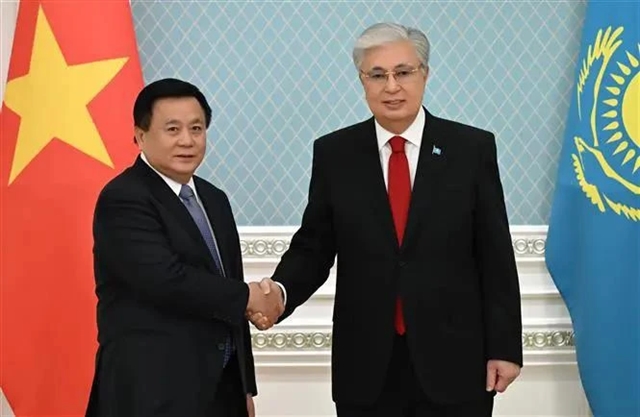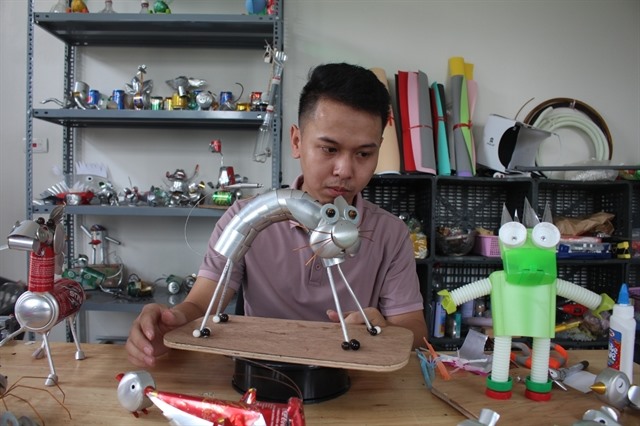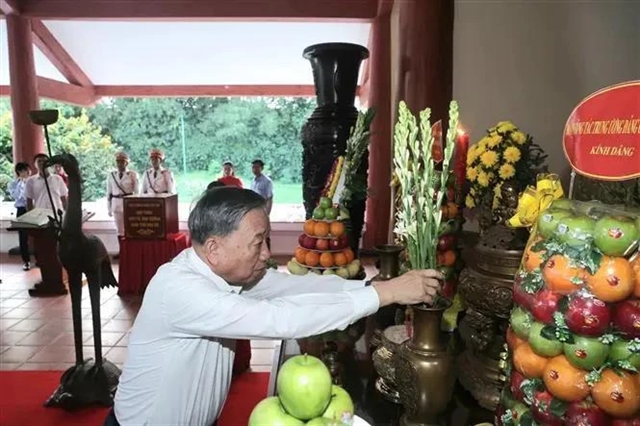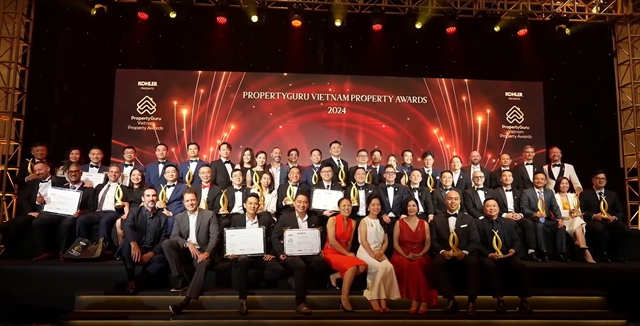

Lưu Chung Nghĩa is worried about the amount of plastic that is being thrown away. So, he is making toys from plastic goods to give the plastic a new use.

|
Nghĩa has created hundreds of toys from recyclable materials like old plastic bottles and cans. Photo courtesy of Lưu Chung Nghĩa
By Lương Thu Hương
After a hard day at work, Lưu Chung Nghĩa from Võng La Commune on the outskirts of Hà Nội returns home to his favourite hobby: creating toys from trash.
In his skillful hands, used cans, cardboard, plastic bags and foam boxes are turned into colourful toy insects and animals that children love.
Making toys has been a hobby since childhood for this 29-year-old, but the idea of using recyclable materials first came to him after a visit to the northern province of Lạng Sơn three years ago when he saw an old man making a funny looking toy from used plastic bottles.
As someone concerned about protecting the environment and the excessive disposal of plastic items, Nghĩa started to learn how to recycle things on the internet.
So he started off by creating simple toy animals like mice, pigs and bees out of plastic bottles or cans.
“You don't see many people in Việt Nam making toys from plastic bottles. I've asked my relatives and friends to stop throwing recyclable rubbish away and instead give it to me,” he says.
Nghĩa also collects plastic rubbish and rubber tyres from the roadside on the way home after work, which he cleans thoroughly to use for his creations.
The toy maker says his first items were made mainly from soft drink cans. After that, he gradually started using a variety of plastic bottles as well, most of which were daily items like shampoo or cosmetic bottles.
Nghĩa has created hundreds of toys made from waste material, each of which takes him around 15 to 30 minutes to finish. His more sophisticated designs might take up to weeks, like a locust made from used cans or a crocodile made from cardboard. The inspirations for his creations are mainly taken from cinemas and his experiences.
“I start making toys after dinner. New ideas come to me every day so sometimes I create something beyond the imagination.
My neighbours' children like my toys so I've started showing them how to make them by themselves using recyclable materials, I want to teach them about environmental protection and how to create their favourite toys,” Nghĩa says.
He has also made jewellery and home décor items from waste materials.
“I recently created a set of jewellery from used cans, plastic bottles and other materials which I was so happy with I gave it to a friend as a gift,” he adds.
Besides giving gifts to friends, he has also donated his toys to several charity programmes dedicated to disadvantaged children. His toys might be small and simple but they contain a meaningful message about environmental protection.
“Through my creations, I hope to contribute to raising people’s awareness and appeal to them to reduce their use of single-use plastics.”
However, Nghĩa has no plans to promote his creations for commercial purposes. His main job is running his own business, and the toys are just as a way for him to relax.
“I make toys to satisfy my passion, not for money. However, if someone asks for one, I use my free time to make it for them for free.
“Some companies have asked me to collaborate with them on projects but I’m still thinking about it because if my toys are mass produced, my initial purpose will be misunderstood,” he adds.
The toy maker has recently launched his own YouTube channel – Nghĩa Odin – giving instructions on how to make simple toys from discarded materials, which he hopes will teach children about environmental protection.
More of Nghĩa’s products can be seen on Facebook page Nghia Odin Crafts. VNS
GLOSSARY
After a hard day at work, Lưu Chung Nghĩa from Võng La Commune on the outskirts of Hà Nội returns home to his favourite hobby: creating toys from trash.
The outskirts of Hà Nội are the areas on the edge of the capital city.
A hobby is a past time people do in their spare time, which interests them.
Trash means garbage.
Making toys has been a hobby since childhood for this 29-year-old, but the idea of using recyclable materials first came to him after a visit to the northern province of Lạng Sơn three years ago when he saw an old man making a funny looking toy from used plastic bottles.
Recyclable materials are materials that can be given a new use after they have been used for what they were originally designed to be used for.
As someone concerned about protecting the environment and the excessive disposal of plastic items, Nghĩa started to learn how to recycle things on the internet.
Concerned means “worried”.
Disposal of plastic items means the throwing away of plastic items. Excessive disposal of plastic items means too much throwing away of plastic items.
“You don't see many people in Việt Nam making toys from plastic bottles. I've asked my relatives and friends to stop throwing recyclable rubbish away and instead give it to me,” he says.
Relatives are people who are from the same big family as you, such as cousins, brothers, sisters, grandparents and so on.
The toy maker says his first items were made mainly from soft drink cans.
Items are things.
After that, he gradually started using a variety of plastic bottles as well, most of which were daily items like shampoo or cosmetic bottles.
If there is a variety of plastic bottles, there are many different types of plastic bottles.
Cosmetics are oils, powders and other things people put on their skin to make themselves look nicer.
His more sophisticated designs might take up to weeks, like a locust made from used cans or a crocodile made from cardboard.
Sophisticated means “smart”.
The inspirations for his creations are mainly taken from cinemas and his experiences.
Inspirations are things that make people want to go out and do something positive.
Cinemas are movie houses.
“ New ideas come to me every day so sometimes I create something beyond the imagination.”
Your imagination is the world of things you make up in your head that are not necessarily to do with anything real.
He has also made jewellery and home décor items from waste materials.
Décor means decoration.
Besides giving gifts to friends, he has also donated his toys to several charity programmes dedicated to disadvantaged children.
Donated means “gave”.
Disadvantaged children are children who are poor and have not had opportunities.
“Through my creations, I hope to contribute to raising people’s awareness and appeal to them to reduce their use of single-use plastics.”
Awareness means knowing about something.
To appeal is to ask formally for something to be changed.
To reduce use of single-use plastics means to use them less often.
However, Nghĩa has no plans to promote his creations for commercial purposes.
To promote the things you have created means to say a lot about them so that people get to know the good things about them.
Commercial means “money-making”
“Some companies have asked me to collaborate with them on projects but I’m still thinking about it because if my toys are mass produced, my initial purpose will be misunderstood,” he adds.
To collaborate means to work jointly on a project.
If something is mass produced, many, many are produced at once.
Initial means “first”.
People are misunderstood when they say something and people think it means something different.
The toy maker has recently launched his own YouTube channel – Nghĩa Odin – giving instructions on how to make simple toys from discarded materials, which he hopes will teach children about environmental protection.
Materials that have been discarded have been thrown away.
WORKSHEET
Find words that mean the following in the Word Search:
l | o | c | u | s | t | l | s | n | m |
w | c | d | g | i | b | p | c | r | o |
o | s | c | i | k | o | l | s | i | n |
b | e | t | f | n | n | t | y | v | e |
m | o | g | t | e | n | n | z | e | y |
c | u | z | b | a | n | e | r | d | n |
c | a | r | d | b | o | a | r | d | v |
t | u | r | n | l | e | a | n | l | i |
ANSWERS: 1. Money; 2. Gift; 3. Locust; 4. Cardboard; 5. Dinner.




